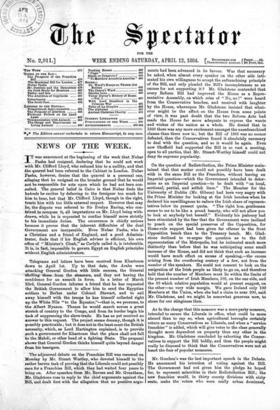The adjourned debate on the Franchise Bill was resumed on
Monday by Mr. Stuart Wortley, who devoted himself to the rather barren task of proving that the Liberals could not possibly care for a Franchise Bill, which they had waited four years to bring on. After speeches from Mr. Barran and Mr. Grantham, Mr. Gladstone rose to reply to the chief arguments against the Bill, and dealt first with the allegation that no positive argu- ments had been advanced in its favour. Was that necessary he asked, when almost every speaker on the other side inti- mated his own willingness to accept the enfranchising principle of the Bill, and only pleaded the Bill's incompleteness as an excuse for not supporting it ? Mr. Gladstone contended that every Reform Bill had improved the House as a Repre- sentative Assembly, on which cries of "No, no !" were heard from the Conservative benches, and received with laughter by the House, whereupon Mr. Gladstone insisted that what- ever might be the effect on the House from some points of view, it was past doubt that the two Reform Acts had made the House far more adequate to express the wants and wishes of the nation as a whole. He denied that in 1866 there was any more excitement amongst the nnenfranchised classes than there now is ; but the Bill of 1866 was no sooner defeated, than the Conservatives found it absolutely necessary to deal with the question, and so it would be again. Even now Sheffield had supported the Bill in so vast a meeting, open to all parties, that Mr. Stuart-Wortley himself could not deny its supreme popularity.


































